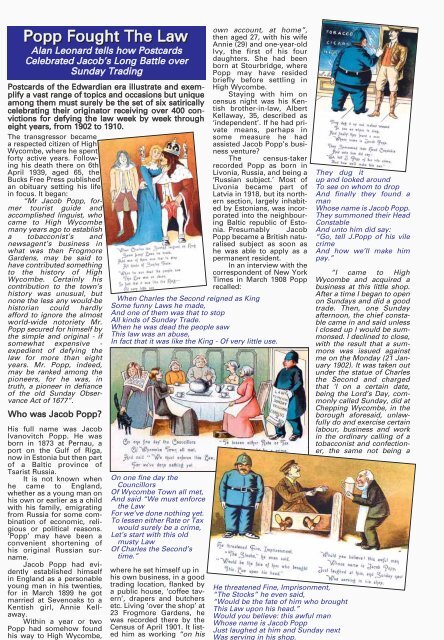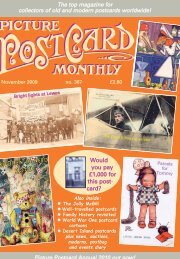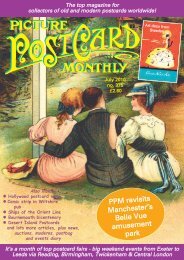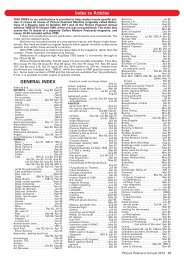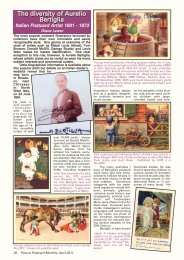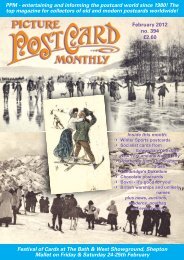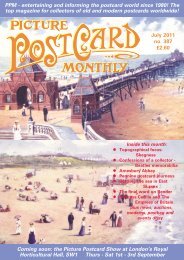Christmas special: Postcard Stockings galore! - Picture Postcard ...
Christmas special: Postcard Stockings galore! - Picture Postcard ...
Christmas special: Postcard Stockings galore! - Picture Postcard ...
Create successful ePaper yourself
Turn your PDF publications into a flip-book with our unique Google optimized e-Paper software.
Popp Fought The Law<br />
Alan LLeonard ttells hhow P<strong>Postcard</strong>s<br />
Celebrated JJacob’s LLong BBattle oover<br />
Sunday TTrading<br />
<strong>Postcard</strong>s of the Edwardian era illustrate and exemplify<br />
a vast range of topics and occasions but unique<br />
among them must surely be the set of six satirically<br />
celebrating their originator receiving over 400 convictions<br />
for defying the law week by week through<br />
eight years, from 1902 to 1910.<br />
The transgressor became<br />
a respected citizen of High<br />
Wycombe, where he spent<br />
forty active years. Following<br />
his death there on 6th<br />
April 1939, aged 65, the<br />
Bucks Free Press published<br />
an obituary setting his life<br />
in focus. It began:<br />
“Mr Jacob Popp, former<br />
tourist guide and<br />
accomplished linguist, who<br />
came to High Wycombe<br />
many years ago to establish<br />
a tobacconist’s and<br />
newsagent’s business in<br />
what was then Frogmore<br />
Gardens, may be said to<br />
have contributed something<br />
to the history of High<br />
Wycombe. Certainly his<br />
contribution to the town’s<br />
history was unusual, but<br />
none the less any would-be<br />
historian could hardly<br />
afford to ignore the almost<br />
world-wide notoriety Mr.<br />
Popp secured for himself by<br />
the simple and original - if<br />
somewhat expensive -<br />
expedient of defying the<br />
law for more than eight<br />
years. Mr. Popp, indeed,<br />
may be ranked among the<br />
pioneers, for he was, in<br />
truth, a pioneer in defiance<br />
of the old Sunday Observance<br />
Act of 1677”.<br />
Who was Jacob Popp?<br />
His full name was Jacob<br />
Ivanovitch Popp. He was<br />
born in 1873 at Pernau, a<br />
port on the Gulf of Riga,<br />
now in Estonia but then part<br />
of a Baltic province of<br />
Tsarist Russia.<br />
It is not known when<br />
he came to England,<br />
whether as a young man on<br />
his own or earlier as a child<br />
with his family, emigrating<br />
from Russia for some combination<br />
of economic, religious<br />
or political reasons.<br />
‘Popp’ may have been a<br />
convenient shortening of<br />
his original Russian surname.<br />
Jacob Popp had evidently<br />
established himself<br />
in England as a personable<br />
young man in his twenties,<br />
for in March 1899 he got<br />
married at Sevenoaks to a<br />
Kentish girl, Annie Kellaway.<br />
Within a year or two<br />
Popp had somehow found<br />
his way to High Wycombe,<br />
where he set himself up in<br />
his own business, in a good<br />
trading location, flanked by<br />
a public house, ‘coffee tavern’,<br />
drapers and butchers<br />
etc. Living ‘over the shop’ at<br />
23 Frogmore Gardens, he<br />
was recorded there by the<br />
Census of April 1901. It listed<br />
him as working “on his<br />
16 <strong>Picture</strong> <strong>Postcard</strong> Monthly December 2009<br />
own account, at home”,<br />
then aged 27, with his wife<br />
Annie (29) and one-year-old<br />
Ivy, the first of his four<br />
daughters. She had been<br />
born at Stourbridge, where<br />
Popp may have resided<br />
briefly before settling in<br />
High Wycombe.<br />
Staying with him on<br />
census night was his Kentish<br />
brother-in-law, Albert<br />
Kellaway, 35, described as<br />
‘independent’. If he had private<br />
means, perhaps in<br />
some measure he had<br />
assisted Jacob Popp’s business<br />
venture?<br />
The census-taker<br />
recorded Popp as born in<br />
Livonia, Russia, and being a<br />
‘Russian subject.’ Most of<br />
Livonia became part of<br />
Latvia in 1918, but its northern<br />
section, largely inhabited<br />
by Estonians, was incorporated<br />
into the neighbouring<br />
Baltic republic of Estonia.<br />
Presumably Jacob<br />
Popp became a British naturalised<br />
subject as soon as<br />
he was able to apply as a<br />
permanent resident.<br />
In an interview with the<br />
correspondent of New York<br />
Times in March 1908 Popp<br />
recalled:<br />
When Charles the Second reigned as King<br />
Some funny Laws he made,<br />
And one of them was that to stop<br />
All kinds of Sunday Trade.<br />
When he was dead the people saw<br />
This law was an abuse,<br />
In fact that it was like the King - Of very little use.<br />
On one fine day the<br />
Councillors<br />
Of Wycombe Town all met,<br />
And said “We must enforce<br />
the Law<br />
For we’ve done nothing yet.<br />
To lessen either Rate or Tax<br />
would surely be a crime,<br />
Let’s start with this old<br />
musty Law<br />
Of Charles the Second’s<br />
time.”<br />
He threatened Fine, Imprisonment,<br />
“The Stocks” he even said,<br />
“Would be the fate of him who brought<br />
This Law upon his head.”<br />
Would you believe: this awful man<br />
Whose name is Jacob Popp<br />
Just laughed at him and Sunday next<br />
Was serving in his shop.<br />
They dug it<br />
up and looked around<br />
To see on whom to drop<br />
And finally they found a<br />
man<br />
Whose name is Jacob Popp.<br />
They summoned their Head<br />
Constable<br />
And unto him did say:<br />
“Go, tell J.Popp of his vile<br />
crime<br />
And how we’ll make him<br />
pay.”<br />
“I came to High<br />
Wycombe and acquired a<br />
business at this little shop.<br />
After a time I began to open<br />
on Sundays and did a good<br />
trade. Then, one Sunday<br />
afternoon, the chief constable<br />
came in and said unless<br />
I closed up I would be summonsed.<br />
I declined to close,<br />
with the result that a summons<br />
was issued against<br />
me on the Monday (21 January<br />
1902). It was taken out<br />
under the statue of Charles<br />
the Second and charged<br />
that ‘I on a certain date,<br />
being the Lord’s Day, commonly<br />
called Sunday, did at<br />
Chepping Wycombe, in the<br />
borough aforesaid, unlawfully<br />
do and exercise certain<br />
labour, business and work<br />
in the ordinary calling of a<br />
tobacconist and confectioner,<br />
the same not being a


